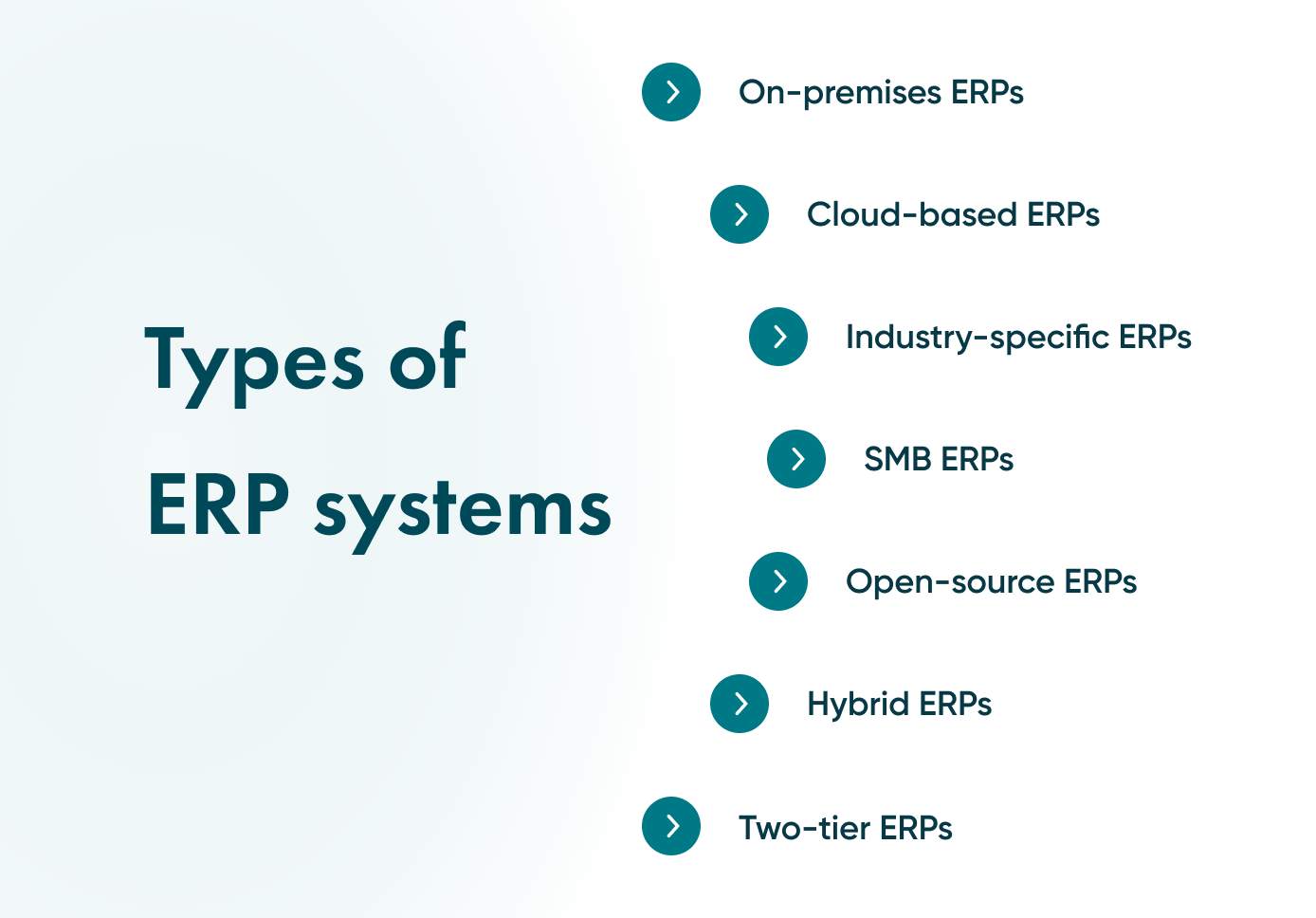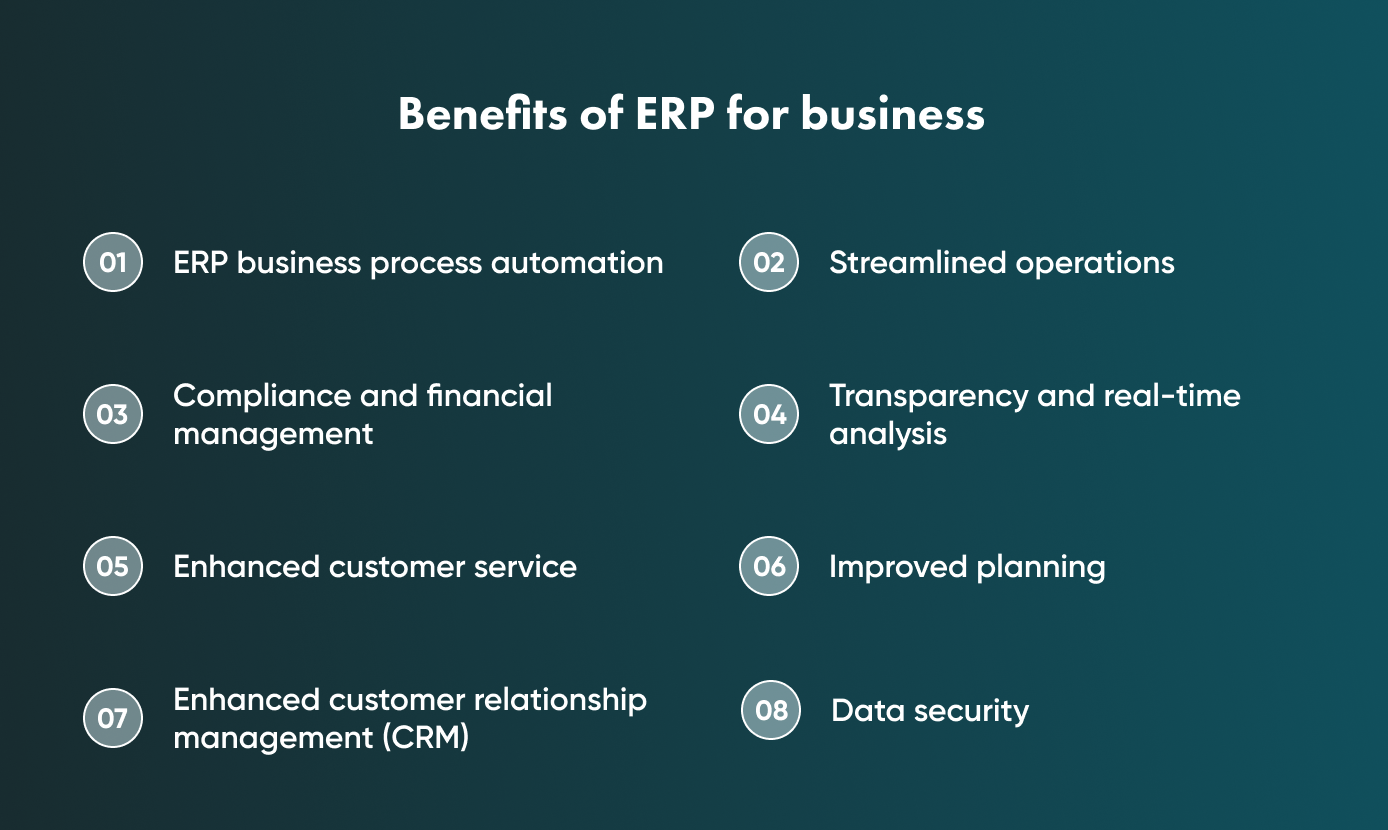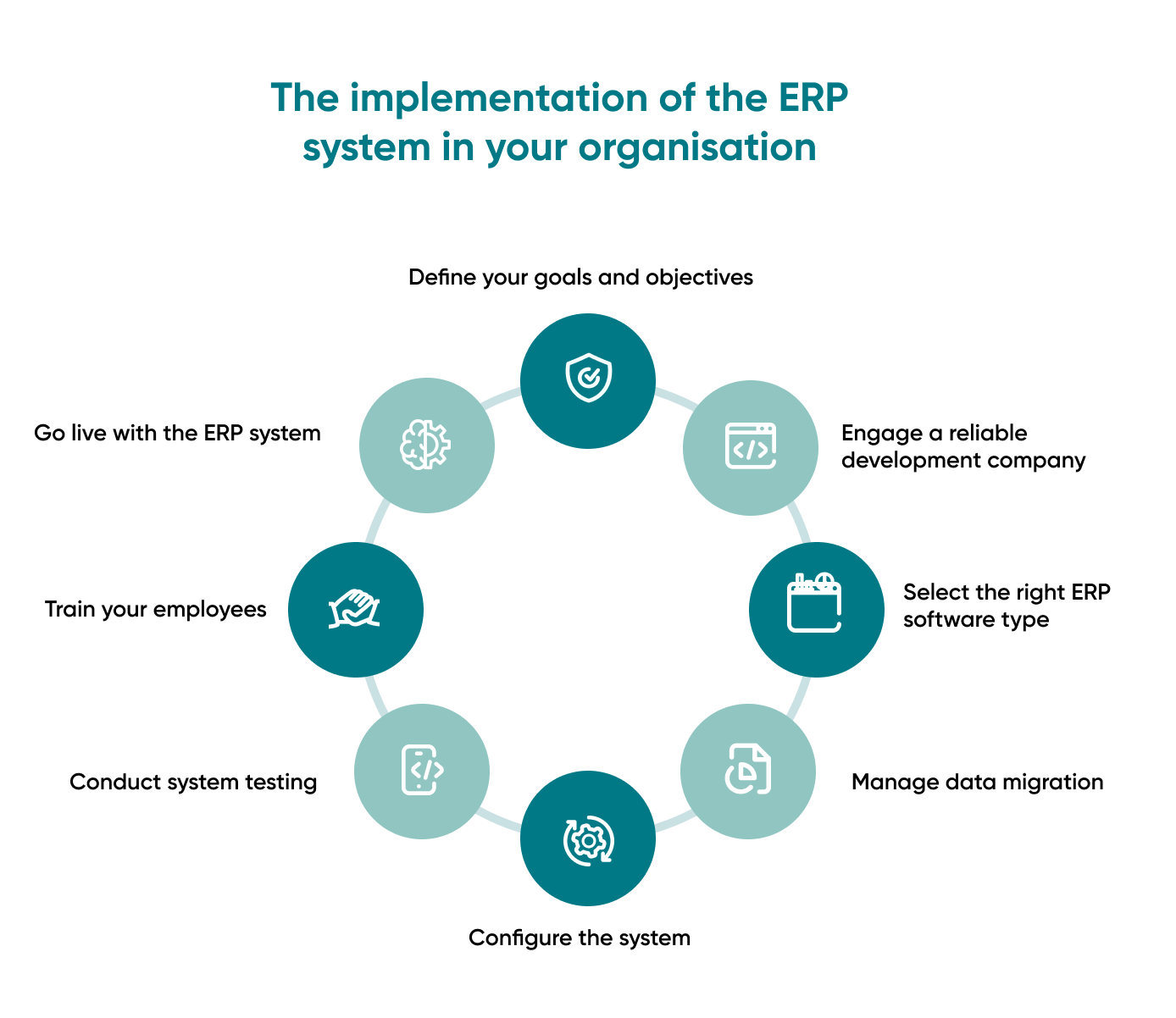How ERP for Business Improves Crucial Operations


The internal operations of any organisation are critical for its success. A key solution that has revolutionised business management is enterprise resource planning (ERP) software.
ERP offers numerous benefits and drives business efficiency and growth by integrating core functions into a unified system. As a result, ERP systems are instrumental in streamlining crucial operations and driving business growth.
In today's unpredictable and complex market environment, businesses must embrace digital transformation to adapt and remain competitive.
Therefore, it is worth noting that real-time data collection and analysis are no longer just advantages but essential for businesses of all sizes. This is where ERP systems come to the rescue, offering a solution to integrate business data and provide valuable insights in real-time, enhancing productivity and efficiency.
Let’s explore how ERPs can significantly improve company performance. By leveraging ERP systems, businesses can optimise their operations, make informed decisions, and achieve sustainable growth in an ever-evolving business landscape.
We will dive deeper into these advantages. Also, we will explain how to implement an ERP system, choose its types, and consider existing levels.
The role of an ERP system in your organisation
ERP is a comprehensive software solution organisations use to efficiently manage and automate various business functions. These systems centralise data, making it easily accessible and organised.
With an ERP, companies can plan accurately and adopt a result-oriented approach. The software allows the scheduling of daily activities and effective financial management. Therefore, its role in a company's development is crucial.
ERP technology also aids employee record management, enabling employers to plan for growth accordingly. They facilitate seamless communication with clients, contributing to effective client relationships.
Additionally, an ERP is a cost-effective system with benefits that outweigh the initial investment because it supports and improves long-term planning and management.
By eliminating the need for multiple management software, ERP integrates various functions such as marketing, sales, quality control, production processes, supply lines, stock management, human resources, customer relationship management, and information technology into a single database.
This integration reduces the chances of errors and minimises the need for re-entry. Furthermore, an ERP enables using a single software and maintains one database for the entire company.
Types of ERP systems
Several types of enterprise resource planning systems are available, each designed to cater to different industries, business sizes, and specific needs. Let’s explore the main types.

On-premises ERPs
On-premises ERP systems are installed and maintained locally on the company's servers and infrastructure. These systems offer high customisation capabilities and direct control over data and security.
However, they require significant upfront investments, maintenance resources, and IT expertise.
Cloud-based ERPs
Cloud-based ERP systems are hosted and accessed over the internet, with the software and data stored on remote servers. As a result, they offer scalability, flexibility, and accessibility from anywhere with an internet connection.
Following a subscription or pay-as-you-go model, cloud-based ERP systems generally require lower upfront costs. This is because the ERP provider manages updates and maintenance.
Industry-specific ERPs
Industry-specific ERP systems are tailored to meet the unique requirements of specific industries, such as (but not limited to):
- Manufacturing
- Healthcare
- Retail
- Construction
These systems have preconfigured modules and functionalities that address industry-specific processes and regulations. Industry-specific ERP environments can optimise and improve efficiency for businesses operating in a particular sector.
Small and medium-sized business (SMB) ERPs
SMB ERP systems are designed specifically for small and medium-sized businesses. These systems offer streamlined features and functionalities that suit the needs and budgets of smaller organisations.
In addition, SMB ERP systems typically focus on essential modules, such as accounting, inventory and customer management, while offering scalability options for future growth.
Open-source ERPs
Open-source ERP systems provide the source code openly, allowing businesses to modify and customise the software to fit their requirements.
These systems offer flexibility and cost savings in terms of licensing fees. However, implementing and maintaining open-source ERP systems usually requires advanced technical expertise.
Hybrid ERPs
Hybrid ERP systems combine on-premises and cloud-based solutions, allowing businesses to leverage the advantages of both approaches.
This ERP system provides flexibility in choosing which components to keep on-premises and which to move to the cloud. Hybrid ERP systems can be helpful for businesses that have specific security or compliance requirements but also want to benefit from cloud accessibility.
Two-tier ERPs
Building a two-tier ERP involves implementing two separate ERP systems, one at the corporate level and another at the subsidiary or division level. Large organisations often use this approach with multiple business units or subsidiaries in different regions or industries.
The corporate-level business ERP system manages enterprise-wide functions, while the subsidiary-level ERP systems cater to specific local or departmental requirements.
It's essential for businesses to carefully assess their specific needs, industry requirements, scalability, budget, and IT capabilities when choosing the type of ERP system that best aligns with their objectives and operational structure.
Levels of ERP systems
ERP systems typically operate at multiple organisational levels, facilitating the integration and management of various processes and functions. Here are the different levels of ERP:
Strategic level
ERP systems support strategic decision-making at the highest level by providing executives and top-level management with real-time insights and data analysis. It includes financial planning, budgeting, strategic resource allocation, and long-term business planning.
Tactical level
ERP systems also operate at the tactical level, assisting middle managers in executing strategic decisions and managing day-to-day operations. This level involves inventory management, production planning, procurement, resource allocation, and workforce management.
Operational level
The operational level of ERP focuses on the execution of specific tasks and activities within various departments. It involves transactional processes such as order management, sales, human resources, finance, and accounting. ERP systems streamline and automate these operational activities, improving efficiency and data accuracy.
Departmental level
ERP systems provide functionality and support at the departmental level, catering to specific needs and requirements of different departments such as finance, HR, marketing, sales, and production. This level ensures seamless information flow and departmental collaboration, enabling cross-functional coordination.
Individual user level
Finally, ERP systems also operate at the individual user level, offering personalised access and functionalities tailored to the needs of employees. This level allows individual users to access relevant data, perform specific tasks, and generate reports based on their roles and responsibilities.
By functioning at these different levels, ERP systems enable companies to achieve integration and efficiency across the entire business, from strategic decision-making to day-to-day operations.
They provide a unified platform for data management, communication, and collaboration, enhancing productivity and driving organisational success.
Benefits of ERP in business processes
Implementing ERP systems can significantly enhance a company's performance by establishing effective methods for resource planning and maximising productivity. So let's examine how ERP implementation positively impacts business performance.

Business process automation
ERP systems aid in automating various business tasks and processes, improving efficiency, and time management. This automation reduces repetitive tasks, allowing employees to focus on other critical operations.
Streamlined operations
Implementing an ERP in operations management streamlines business processes by automating manual tasks and enhancing inventory management. In addition, the software facilitates seamless communication across departments, promoting collaboration and efficient workflow.
Compliance and financial management
ERP software helps businesses adhere to specific country regulations and compliance requirements, particularly in financial management. By incorporating compliance features, an ERP ensures adherence to legal guidelines.
Transparency and real-time analysis
One of the key advantages of an ERP is the transparency it offers. The software provides clear visibility into all aspects of the business, granting access to relevant departments. In addition, real-time data availability empowers departments to make informed decisions and plan effectively.
Enhanced сustomer service
ERP systems benefit both the company and its clients. By streamlining and centralising client data, sales teams can focus on building strong customer relationships. With end-to-end tracking capabilities, companies can deliver superior customer service.
Improved planning
ERP systems provide a range of analytical tools, enabling companies to analyse various analyses of their operations. This data-driven approach facilitates better planning, allowing the supervisors to make informed decisions and optimise processes.
Enhanced customer relationship management
Many modern ERP systems include CRM features that automate customer service tasks. This functionality tracks transactions, orders, service requests, and complaints. In addition, detailed customer analytics support targeted marketing efforts, leading to increased customer retention and acquisition.
You can read our comprehensive article to learn more about the benefits of CRM.
Data security
Data security is a paramount concern for organisations. ERP software centralises data in a secure database, minimising the risk of data breaches and system failures. It enhances data security and safeguards sensitive information.
Ready to optimise your business operations? Learn how ERP can revolutionise your business processes. Contact Go Wombat for further assistance!
Industries where ERP support is crucial
Does your business require an ERP system or not? That is a good question. Actually, most industries need it today since ERP supports multiple business processes. Here is a list of the top industries that need to use ERP:
Retail
The retail industry dramatically benefits from NetSuite consulting services as it deals with various complexities that can be effectively managed through ERP solutions.
Implementing an ERP software platform in retail streamlines sales, payments, inventory, marketing, and tracking processes, providing real-time data access.
Wholesale distribution
ERP implementation is crucial for the wholesale distribution industry, particularly cost management. Instead of relying on multiple software platforms, ERP solutions offer a single framework for managing finances.
Today's ERP solutions are highly scalable and flexible, enabling efficient management of wholesale business processes.
Manufacturing
ERP plays a vital role in manufacturing by facilitating communication between the accounting, production, and purchasing departments. It enhances effective communication between internal and external departments, provides visibility over supply chains and inventories, and streamlines operations.
You can read our article about custom ERP development for the oil and gas industry as an example of a top-notch ERP application.
Finance
The finance industry benefits from ERP vendors to optimise operational efficiencies and gain real-time insights. ERP solutions offer unified reporting systems, seamless communication, and quick responsiveness, allowing the finance industry to gain a competitive edge.
Professional services
ERP platforms play a significant role in the professional services industry by modernising operational structures and managing various aspects like investments, customer data, and employee records.
Food and beverage
ERP platforms in the food and beverage industry enhance operational efficiency, provide supply chain visibility, and maintain critical components like temperature control and traceability.
Healthcare
The healthcare industry heavily relies on ERP systems for patient data transfer, immediate access during urgent medical care, and updating vital healthcare information systems. Additional modules like financial management and supply chain management further enhance efficiency.
Advertising and media
ERP implementation in media firms provides better insights for brand promotion, supports business intelligence, and offers advanced reporting capabilities.
Software companies
ERP processes help software companies deliver customised solutions based on user preferences, gain control over big data, and achieve long-term business efficiency.
Construction
The construction industry benefits from ERP solutions in managing finances, executing designs and improving profit margins. ERP solutions can be tailored to fit the existing business model, bringing significant workflow improvements.
The implementation of the ERP system in your organisation
Finally, here is a step-by-step guide on implementing an ERP system in your business and making it efficient. Pay attention to this section because it is vital for you to know all the details.

Define your goals and objectives
Implementing an ERP system requires careful planning and execution to ensure a smooth ERP process and successful integration of business operations. So before implementing an ERP solution, it is essential to establish your goals and objectives.
Understanding how an ERP system can help your business achieve these goals is crucial. Analyse your key performance indicators (KPIs) to identify areas where ERP software can address challenges and align with future projections.
Engage a reliable software development company
Partnering with a reputable software development company is crucial to facilitate a seamless implementation process.
A company like Go Wombat will help you develop custom ERP software for your industry, considering all the specific nuances.
Furthermore, cooperating with experienced developers means the ERP process flow becomes smoother and more straightforward since our skills and qualification will be your assistant.
Select the right ERP software type
Choosing the appropriate ERP software type tailored to your business requirements is critical. Avoid a one-size-fits-all approach, as each ERP solution differs in benefits.
Instead, consider your industry, system requirements, and future expectations. Then, consult with an ERP consultant to make informed decisions.
Manage data migration
Efficient data migration is necessary for successful ERP implementation. Filtering unnecessary or incorrect data ensures a clean and accurate transfer to the new system, streamlining operations and maintaining data integrity.
Configure the system
Launch and implement the ERP solution after selecting the ideal ERP software and completing accurate data migration.
Configure and optimise the ERP system to suit your business needs. The duration of this process varies depending on software complexity, so strike a balance between attention to detail and implementation time. Discuss the timeline and strategy with your vendor in advance.
Conduct system testing
Once the ERP system is configured, enter a testing phase to ensure proper functionality.
Thorough testing, including system and user acceptance testing, provides valuable insights into system performance, facilitating a smooth transition. Avoid going live without adequate testing.
Train your employees
Train your employees on effectively using the new ERP system after implementation and testing.
Hire experts to provide on-site training, ensuring employees have a comprehensive understanding and proficiency in the software. Provide additional training to your IT team to handle any technical issues that may arise.
Go live with the ERP system
Once your employees are well-trained, it's time to go live and streamline your business operations using the new ERP system.
Finally, perform tests to ensure optimal performance. Remember that ERP implementation requires continuous effort and attention beyond the initial implementation and training stages.
Conclusion
By streamlining operations, integrating data, and enabling real-time insights, ERP technology empowers businesses to achieve higher levels of efficiency, productivity, and competitiveness. From improved inventory management to streamlined financial processes, ERP provides a solid foundation for growth and success.
However, it is essential to note that the ERP journey continues after implementation. Continuous evaluation, adaptation, and enhancement are keys to maximising the benefits of ERP and staying ahead in a rapidly evolving business landscape. Regularly assess your ERP system, identify areas for improvement, and leverage new features and innovations to drive continuous improvement.
Regardless, you will need the assistance of a talented team of developers, and Go Wombat is always open to new challenges. Let our professionals help your business improve critical operations using an integrated custom ERP system.
Take control of your business processes and achieve operational excellence with ERP. Build your ERP with Go Wombat — contact us now!
Unlock Success with Premium Software Development
Contact us


FAQs
What are the key benefits of ERP for the business?
ERP for business has key benefits: ERP business process automation, streamlined operations, compliance and financial management, transparency and real-time analysis, enhanced customer service, improved planning, enhanced customer relationship management (CRM), and data security.
Why is a good ERP system important for the business?
It is suitable for several reasons, but the main one is that a sound ERP system enhances and automates business processes, leading to enhanced effectiveness and output.
Through consolidating data and integrating different departments like finance, operations, sales, and HR, an ERP system eliminates manual tasks, minimises errors, and enables employees to dedicate their time to more valuable tasks.
This improved efficiency results in cost savings, optimised resource distribution, and quicker response times.
Which industries need ERPs?
ERPs are beneficial and widely used across various industries. Some industries that commonly implement ERPs include retail, wholesale distribution, manufacturing, finance, professional services, food and beverage, healthcare, advertising and media, software companies, and construction.
How can we help you ?






